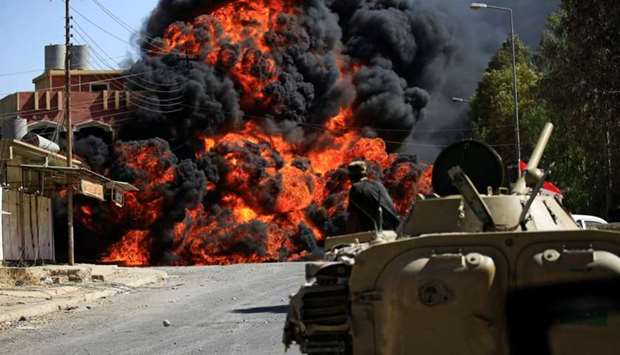"Seventy percent of the city has been liberated.... God willing, the remaining part will be liberated soon," Iraqi Foreign Minister Ibrahim al-Jaafari said at a news conference with his French counterpart, Jean-Yves Le Drian, and French Defence Minister Florence Parly, in Baghdad.
The offensive on Tal Afar, which lies on the supply route between Syria and the former Islamic State stronghold of Mosul, started on Aug. 20.
The elite Counter Terrorism Service "liberated the citadel neighborhood .. and raised the Iraqi flag on top of the citadel building," a statement from the Iraqi joint operations command said.
Much of the Ottoman-era citadel itself was destroyed by the militants end 2014.
The city, located 80 km (50 miles) west of Mosul, has produced some of the militant group's most senior commanders. It experienced cycles of sectarian violence between Sunnis and Shias after the US-led invasion of Iraq in 2003.
Tal Afar, which had a pre-war population of about 200,000, is the latest objective in the US-backed war on Islamic State following the recapture of Mosul after a nine-month campaign that left much of the city, the biggest in northern Iraq, in ruins.
The fall of Mosul effectively marked the end of the self-proclaimed caliphate Islamic State declared over parts of Syria and Iraq in 2014. Tal Afar was cut off from the rest of IS-held territory in June.
Up to 2,000 militants remain in Tal Afar, according to US and Iraqi military commanders. The number of civilians left in the city is between 10,000 and 20,000, according to the US military.
As in the battle for Mosul, civilians are suffering.
Waves of residents fled the city in the weeks before the battle started. Those remaining are threatened with death by the militants, who have held a tight grip there since 2014, according to aid organisations and residents who managed to flee. On Tuesday, the UN refugee agency UNHCR said those who had fled were suffering from dehydration and exhaustion, having lived off unclean water and bread for three to four months.
People were arriving at camps for displaced people with wounds from sniper fire and mine explosions.

Smoke rises during clashes between joint troop of Iraqi army and Popular Mobilization Forces (PMF) against the Islamic State militants in Tal Afar, Iraq August 26, 2017
Iraqi forces have dislodged Islamic State from 70 percent of Tal Afar, a stronghold of the militants in northwestern Iraq, including its central citadel neighborhood, officials and military commanders said on Saturday.
